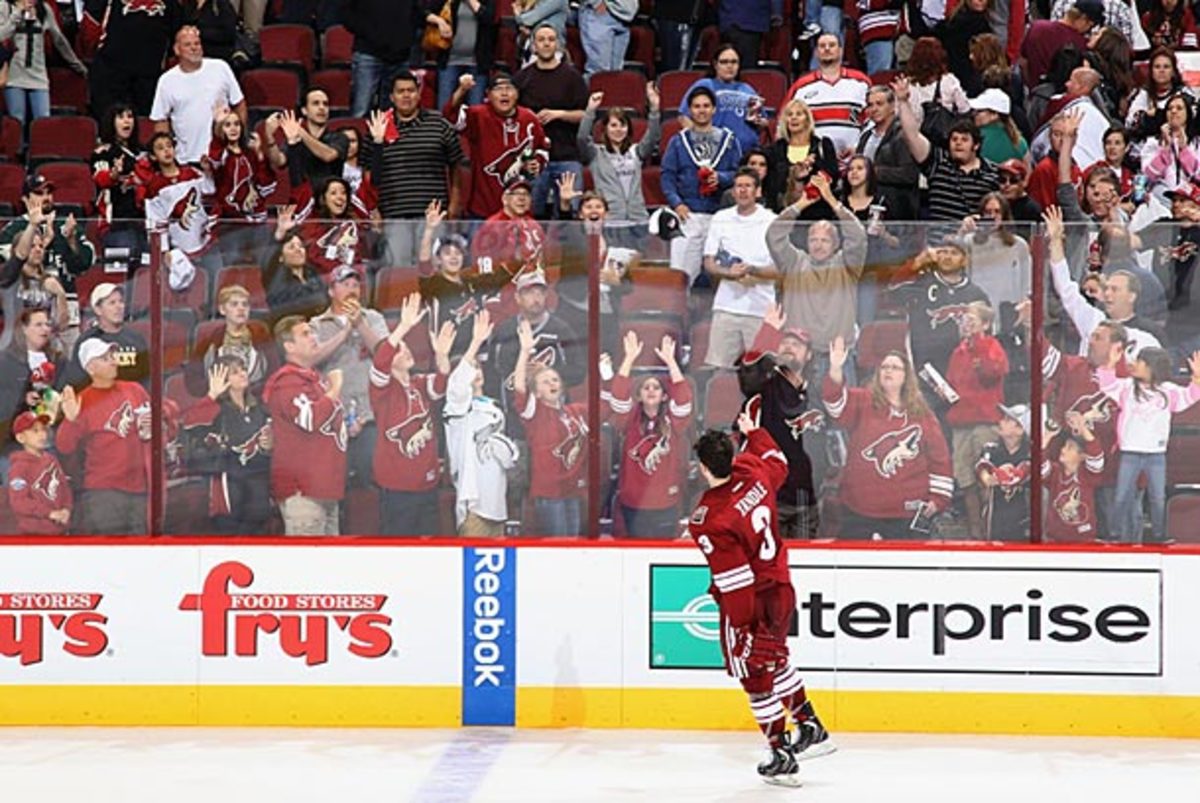Coyotes sale is complete, but one uncertainty still remains
Can the Coyotes finally prove that they can attract fans and sponsors under new ownership? (Bill Smith/NHLI via Getty Images)
By Sarah Kwak
After more than four years of operating under NHL ownership and multiple failed purchase attempts, the Phoenix Coyotes were officially sold Monday. Now, finally, they are somebody else’s problem. And those people are the IceArizona Acquisition Co., a group of 11, led by Chairman George Gosbee and pending CEO Anthony LeBlanc, who will now assume control of the beleaguered franchise.
To say the least, it has been a long and tortured journey for the Coyotes since former owner Jerry Moyes filed bankruptcy in 2009. No fewer than five ownership groups tried and failed to purchase the club, and every discussion seemed to be cast under the question of the long-term survivability of an ice hockey team in the desert.
Well, while the players flourished on the ice, making the playoffs for three straight seasons beginning 2010 and reaching the Western Conference final in 2012, the off-ice uncertainty continued to be a dark cloud over the team. Any momentum the team could muster would promptly be thwarted given the team’s budget constraints and the continual prospect of relocation.
But when the city of Glendale finally agreed to an arena-management deal where the city would pay $15 million annually over 15 years to manage Jobing.com Arena last month, it finally paved the way for the group to go ahead with the purchase. Without such a guarantee from the city, relocation of the franchise would have been the next logical step.
The group still has an opt-out after five years if the losses it incurs become unmanageable, but IceArizona, the NHL and the city say they are committed to making things work in Glendale. And now, they have the chance to find out if hockey can work in Arizona.
Under Moyes’ ownership, the Coyotes floundered, routinely stuck in the bottom of the conference; they went six straight years without so much as a sniff at the postseason. Things on the ice got better under coach Dave Tippett, but with the club in bankruptcy, there was little money thrown toward marketing or staffing, let alone to acquire players. With such an uncertain future, sponsorships were hard to come by. Or so they always said.
“We haven’t had that combination that all championship organizations have -- that is a strong, stable ownership and the potential of the franchise winning—in a long time,” LeBlanc said. “This is a franchise that hasn’t had the opportunity to show its true potential.”
The new ownership group plans be hands on, LeBlanc said Monday, but almost exclusively on the business side of things. They’ll let general manager Don Maloney and his staff work hockey operations as they have, and they plan to give the 2010 GM of the Year a slightly larger budget in the coming seasons (though probably nowhere near the ceiling), which should be a boon for the on-ice product.
With an ownership group in place, one with looser purse strings than the NHL, the Coyotes have a chance to prove that the team can, in fact, attract fans and sponsors to Glendale and be a profitable franchise -- even if only very marginally. Though the sale marks the end of this agonizing period of league ownership, in many ways, it’s now just the beginning of another.

































